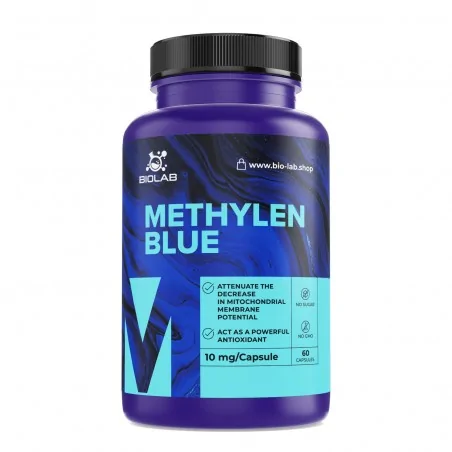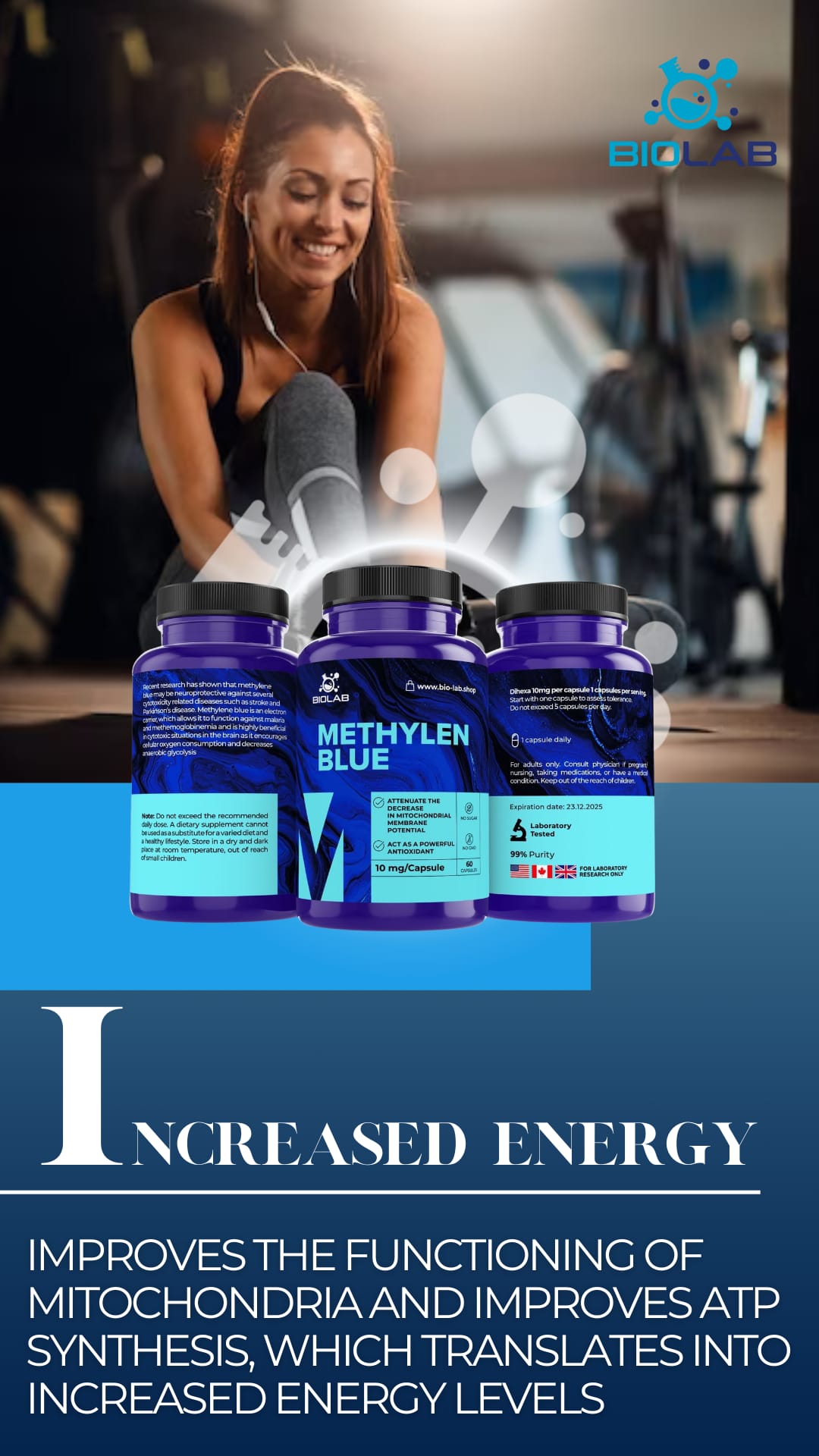
METHYLEN BLUE 10mg/60caps.
Product code:
Buy 3 and get 3% discount
Buy 5 and get 5% discount


Product code:
























METHYLEN BLUE
Methylene blue, also known as methylthionine chloride, is a chemical salt used as a dye and drug. It is still on the WHO list of essential medicines. Heinrich Caro first prepared MB in 1876. Methylene blue has been called "the first fully man-made drug." 
Benefits
Is methylene blue still in use today?
Yes, methylene blue is still used in diagnostic procedures to identify abnormal cells. It has a characteristic blue color and is used to treat several disorders, such as methemoglobinemia. MB is most commonly prescribed to treat methemoglobinemia and, occasionally, malaria or cyanide poisoning.
Is methylene blue harmful?
In small doses, methylene blue is not dangerous to most people. People taking certain antidepressants, opioids or antihistamines should not take MB. Pregnant people or those with G6PD deficiency should also stay away from MB. G6PD deficiency is the most common enzymatic defect in humans. It is caused by a deficiency of glucose-6-phosphate dehydrogenase, an enzyme present in red blood cells. The most common symptoms are jaundice and hemolytic anemia.
1. Aging
Methylene blue is good for the skin. MB increases mitochondrial function and reduces oxidative stress - both of which independently improve the appearance of skin. MB has even been used to treat psoriasis, an autoimmune disease. By increasing collagen and elastin production, methylene blue gives skin a more youthful appearance.
https://www.ncbi.nlm.nih.gov/pmc/articles/PMC8699482/
2. Depression
Methylene blue can have a "strong" antidepressant effect. This is because it can increase levels of norepinephrine, serotonin and dopamine in the brain, preventing the breakdown of these neurotransmitters. MB can also regulate anxiety and bipolar disorder, which are closely related to depression. It is not recommended to take MB at the same time as other antidepressants.
https://pubmed.ncbi.nlm.nih.gov/3555627/
https://pubmed.ncbi.nlm.nih.gov/31144270/
3. Lyme disease and co-infections
Although most patients with Lyme disease are cured after 2-4 weeks of antibiotics, up to 20% of patients are not cured as quickly. Methylene blue is a potential alternative for people in whom antibiotics have failed. In the lab, methylene blue effectively killed antibiotic-resistant Lyme disease bacteria. Combining methylene blue with certain antibiotics increases the effectiveness of antibiotics to fight Lyme disease. Studies have also shown that combining methylene blue with antibiotics is more effective than antibiotics alone in treating Bartonella infections.
https://www.ncbi.nlm.nih.gov/pmc/articles/PMC9311795/
https://www.ncbi.nlm.nih.gov/pmc/articles/PMC7149919/
4. Alzheimer's disease, Parkinson's disease
Methylene blue may help prevent Alzheimer's disease, Parkinson's disease and mild cognitive impairment. MB reduces oxidative damage to brain cells - contributing to neurodegenerative disorders such as Alzheimer's and Parkinson's disease. Numerous studies indicate that MB is "a promising neuroprotective intervention for both motor and non-motor" symptoms of Parkinson's disease. MB is not a panacea for neurotoxicity and neurodegenerative diseases, but methylene blue boasts decades of recorded neuroprotective benefits.
https://www.ncbi.nlm.nih.gov/pmc/articles/PMC2992595/
https://pubmed.ncbi.nlm.nih.gov/36804486/
5. Methemoglobinemia
Is a blood disorder that can cause headaches, dizziness, nausea or skin discoloration. Methylene blue is an FDA-approved drug for this mainly genetic disorder, which can turn the color of the blood chocolate-colored. Certain drugs or chemicals can also cause high levels of methemoglobin. MB converts the ferrous iron in hemoglobin into ferrous iron, thus treating the condition. The most common use of methylene blue is to treat methemoglobinemia, for which a doctor may prescribe MB injections.
https://www.ncbi.nlm.nih.gov/books/NBK537317/
6. Nail fungus
Methylene blue can help with fungal infections, similar to bacterial infections. A 2014 study shows that when combined with red LED light, methylene blue effectively treats "distal and lateral nail fungus" (onychomycosis).
https://www.ncbi.nlm.nih.gov/pmc/articles/PMC3938382/
Several groups should not take methylene blue, including:
1. newborns: MB leads to many adverse side effects in newborns that are not seen in adults. Newborns should not take MB.
2. Pregnant women: there is some evidence that MB can cause fetal death when administered to the mother during the second trimester of pregnancy. Accidental exposure to MB in the first trimester may not cause as much fetal damage.
3 Nursing mothers: Methylene blue probably passes into breast milk. There is insufficient evidence to show whether MB is dangerous to infants, so it is best for breastfeeding mothers not to risk it.
4 People with glucose-6-phosphate dehydrogenase (G6PD) deficiency: MB can cause hemolytic anemia in people with G6PD deficiency. Some researchers argue that G6PD deficiency should be a contraindication to the use of methylene blue. MB should be used with care and caution in cases of G6PD deficiency. People taking antidepressants, as the combination can increase serotonin levels to a dangerous degree.

Your review appreciation cannot be sent
Report comment
Report sent
Your report cannot be sent
Write your review
Review sent
Your review cannot be sent
Customers who bought this product also bought:
BPC-157 10mg
RHODIOLA ROSEA 300mg/capsules
BACOPA MONNIERI 500mg/capsules
EXTREME PUMP 2 225mg
N-ACETYL EPITHALON SPRAY 10mg
AC-262 536 60tab/10mg
NAD+
BPC-157 HCL capsules 200mcg
Newsletter
SIGN UP AND STAY UP TO DATE!
We specialize in wholesale and retail supply of high quality peptides.
Category
Our company
Add to wishlist
((title))
Sign in
You need to be logged in to save products in your wishlist.